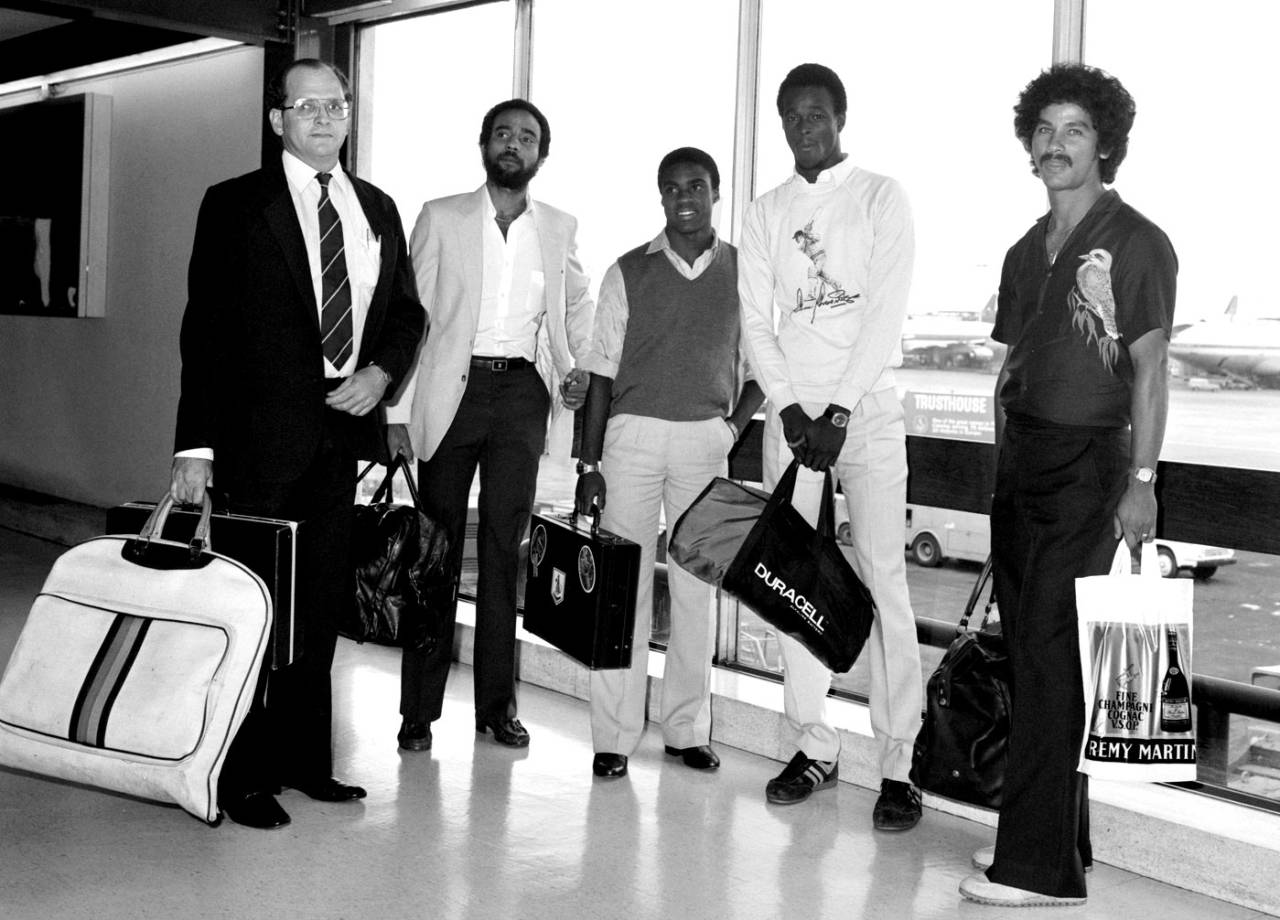When being an India fan doesn't mean being filled with despair
Three painful partnerships, but only one - in a World Cup final - has a happy ending
Samir Chopra
19-Mar-2015

Dujon (second from left) arrives with his team-mates at Heathrow for the 1983 World Cup • PA Photos
On August 3, 1997, late at night, I settled down, as I had done for the previous two nights, with my laptop connected to a dial-up modem, and began monitoring the ball-by-ball text commentary that the diligent residents of the Internet Relay Chat's cricket channel provided. The first Test of the India-Sri Lanka Test series was underway and I was looking forward to how the hosts would respond to India's mammoth 537. The Sri Lankans resumed at 39 for 1, with Sanath Jayasuriya and Roshan Mahanama at the crease. Two hours later, at lunchtime, I packed up. No wickets had fallen, and my resolve to stay awake had faltered. The next morning, I awoke to find the score was 322 for 1. A day later, on waking and going through the same ritual, I found the score had reached 587 for 1. The second wicket would not fall till 615.
Flash forward 17 years. At Trent Bridge, in response to India's first-innings score of 457, England sputtered in their reply, reaching 298 for 9. A healthy first-innings lead for India beckoned. When the smoke cleared, it was England who had a lead of 39 runs, thanks to a world-record partnership for the tenth wicket between Joe Root and Jimmy Anderson.
As these rather depressing numbers indicate, being a fan of the Indian team entails developing a thick skin in dealing with the many, many partnerships that have laid waste many of your cricketing dreams over the years. Still, in detailing these two world-record stands situated at opposed ends of the batting order, I have not forgotten that the most painful partnership of all was one that had a happy ending. And it came in one-day international cricket, not the five-day variety.
On June 25, 1983, in the World Cup final at Lord's, West Indies' reply to India's seemingly puny total of 183 had stumbled, and badly. Desmond Haynes fell at 50, Viv Richards to that catch at 57, and then, most vitally in my rapidly maturing cricket mind, Larry Gomes and Clive Lloyd at 66. (I knew these calm customers were eminently capable of putting their heads down and ticking off the runs required, one by one.) Ten runs later, India were into the tail: Faoud Bacchus had gone at 76.
Incredibly enough, West Indies' target was 108 runs distant, and India only needed to get four wickets.
Unfortunately the two batsmen now at the crease - Jeffrey Dujon and Malcolm Marshall - were no mugs. Marshall would score 92 in a Test against India a few months later. And Dujon, of course, had already established himself as a capable and stylish Test batsman since his debut a year or so before. He had also finished off the Kingston Test against India earlier that year with a dramatic six in the last over of the game. No two ways about it: there was batting talent at the crease.
The 43 runs this pair would put on - moving the score from 76 for 6 to 119 for 7, a scoreline progression I have never forgotten and perhaps never will - were 43 painful stakes into the heart of every Indian fan watching. Every one of them drove grown men, women, and children to distraction; every increment to the scoreboard brought us all closer to disconsolate states of being.
Dujon and Marshall batted calmly; they took singles, they blocked the good balls; they eschewed the dramatic. They were not the greybeards of the team, but they were sensible enough to realise they had all the time they needed, and more, to get to the Promised Land. This was a 60-over game, and haste would most certainly make waste. Of course, they both had aggressive instincts too; so when Balwinder Sandhu, he of the magic delivery that had bowled Gordon Greenidge, bowled a rank long hop, Dujon effortlessly swung the ball over deep-backward square leg, into a crowd of ecstatic West Indies fans, now convinced a trifecta of World Cup wins was theirs for the taking. And I slumped, again, holding my head in my hands, cursing myself for ever having believed an Indian cricketing tale could have a happy ending.
But the scriptwriter, on this occasion, was an Indian. Best of all, he, a batsman who had reconstructed his technique and turned into the world's finest player of fast bowling, was from Delhi, my cricketing home. It was as a bowler - my most esteemed dibbly-dobbler of all - that he would now snuff out the Caribbean candle that threatened to set the Indian house ablaze.
With the score at 119, Dujon played on to Mohinder Amarnath.
In 1994, en route to India via Amsterdam and Amman, I lost my passport at Amman's international airport. I ran around the terminal frantically, panicking, my stomach churning, close to tears, looking for that magical document, without which I would not be able to catch my flight back to India, back to meet family and friends after a too-long interval. Finally I found it, resting on the counter of a coffee shop. Relief flooded through me; I felt weak in the knees. I was saved; I would not be condemned.
It was a familiar feeling; I had felt it before. On June 25, 1983.
Samir Chopra lives in Brooklyn and teaches Philosophy at the City University of New York. @EyeonthePitch